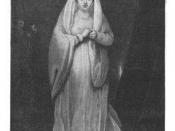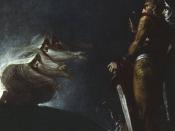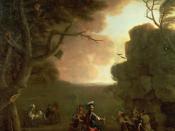ÃÂFair is Foul, and Foul is FairÃÂ"I believe that there is only one story in the world...Humans are caught--in their lives, in their thoughts, in their hungers and ambitions, in their avarice and cruelty, and in their kindness and generosity too--in a net of good and evil...A man, after he has brushed off the dust and chips of his life, will have left only the hard, clean question: Was it good or was it evil? Have I done well--or ill?" ÃÂJohn Steinbeck. This carefully selected quote from John Steinbeck summarizes the theme of Macbeth in just a few sentences. Humans spend their whole life in goodness for fear of what is to become of them in the after life; but in most cases only until something worth being evil comes along. The main character, Macbeth, is said to represent humankind in this play, mainly due to his ability to choose between being considered a hero or a villain.
Even in present day, we are still able to choose how our lives will turn out. The play Macbeth gives us four characters that had spent their lives making decisions that built up to their heroic era or villainous reign: MacDuff, Banquo, Macbeth, and Lady Macbeth.
Macduff is a Scottish general who is only one of the few men that believe that Macbeth killed the King. He is extremely hostile towards MacbethÃÂs kingship, and after his family is murdered by MacbethÃÂs servants in Act IV scene ii, he decides to join Malcom and the English army in a crusade in order to put the rightful king on the throne. Macduff feels that he needs to do the right thing for his country, and even though his family has just been murdered, he shows no signs of weakness and fights for the innocent people of Scotland. Macduff shows in this scene that he is extremely dedicated to his country and even exposes himself to great danger in order to protect it. In Act V scene xi, Macduff enters saying ÃÂHail, king! For so thou art. Behold where stands The usurperÃÂs cursed head. The time is free. I see thee compassed with they kingdomÃÂs pearl, That speak my salutation in their minds, Whose voices I desire aloud with mine. Hail, King of Scotland!ÃÂ (216, line 54-59). Macduff has seemed to have decapitated the once king, Macbeth, and is proud to announce the new king of Scotland, Malcom. Macduff consistently shows his extreme dedication to his country, and never puts the well-being of his individual self in front of that priority-wise, this proves him to not be a villain; however, this isnÃÂt true for all characters.
Banquo is at first a friend to Macbeth but represents his opposite, and like Macbeth, he thinks about his ambitions in being great; however not in evil ways will he do to achieve them. When the three witches begin to predict the futures of these two men, in Act 1 scene iii, Macbeth finds out that Banquo will eventually start a line of kings, Macbeth takes this news to drastic measures and has his friend murdered. This actions shows the vast different ideological views between Banquo and Macbeth; Banquo feels that greatness should come through hard work and dedication, and when the witches tell him that he himself will not be king but that he will create a line of successors, he feels no jealousy or disappointment at all. Macbeth, on the other hand, took BanquoÃÂs news as a threat and ended up killing him and attempting to kill the rest of his family. In Act III scene iv, Macbeth finds the ghost of Banquo sitting in his chair during a feast. It is said to believe that it is BanquoÃÂs ghost that begins to haunt Macbeth and not DuncanÃÂs ghost because BanquoÃÂs character serves as the good and the path that Macbeth chose not to take. With this, Banquo represents a hero, and probably the least villainous character in the play.
Macbeth, the main character of the play, is considered to us a brave warrior and courageous man with values and morals, up until his future is told to him by the three evil witches. Macbeth takes the information given to him in Act 1 scene iii with great adoration in that he was to become thane of Glamis, Cawdor, and eventually King. Macbeth questions how he will become king, and the only way is to kill Duncan. This he tells to his wife, Lady Macbeth, and she goes against her husbandÃÂs good conscience and tells him to be a man and kill King Duncan. After the murder, Macbeth beings to feel great discomfort and extreme guilt, and even though he has committed a serious crime, it is still shown that he is feeling remorseful, which gives us the hope that Macbeth is still out hero. Macbeth then kills two of the KingÃÂs guards in order to cover up the murder, has Banquo murdered, and kills MacduffÃÂs family all within a few scenes. By now, readers are suspecting that Macbeth has either gone completely crazy or has just become an all right leader with a few flaws. What readers donÃÂt see is what is happening behind the scenes; Macbeth is beginning to feel like a terrible man, his guilty conscience is catching up with him and he has no problem with expressing it, the cause of everything was in fact, his wife.
Throughout the play, Lady Macbeth consistently acts just the opposite as a lady would. She begins the play as a deeply ambitious and power hungry character who seems to be more risk-taking and ruthless than her husband. In Act I scene vii, Macbeth and Lady Macbeth prepare for DuncanÃÂs murder, and while Macbeth feels doubtful, Lady Macbeth questions his ability of a man: ÃÂWhat beast wasÃÂt, then. That made you break this enterprise to me? When you durst do it, then you were a man; And to be more than what you were, you would Be so much more the manÃÂ (42, lines 47-51). Lady Macbeth seems to not have a conscience, she has planned the murder of the king, and easily tells the uneasy Macbeth that there is nothing to worry about. Clearly, Lady Macbeth was the cause of downfall for her once heroic husband. Later on in the play, Lady Macbeth sleepwalks, and reveals her hidden conscience while doing so; many believe that at this point in her life she had gone insane. She then commits the greatest crime of all in Act V scene v when she kills herself offstage. Lady Macbeth is considered the most evil character in the play, and therefore the real villain.
What differentiates Homo sapiens from other animals is the ability to choose between good and bad. Throughout historical and biblical times, the bad and good have always been implemented. People spend their entire lives living in fear of what will happen to them in their after life, or if there even is an after life. They question who has decided what was to be considered ÃÂgoodÃÂ and what was considered ÃÂevilÃÂ. The bible, and other various religious teachings, were said to be platforms to outline the differences between the two. What ultimately differentiates humans though is the ability to control the good and evil. Macbeth was unable to control his decisions, which technically makes him disabled; however, Lady Macbeth clearly shows that she had been able to make decisions between right and wrong, but purposely chose the evil. Everyone has a right to decide how their life will turn out, and there has been, and always will be two types of people; the ants and the leeches. The ants will always work hard for themselves and their future, while the leeches suck out from what everyone has offered. There will always be druggies and rocket scientists; itÃÂs just a matter of decision making.
Works CitedShakspeare, William. Macbeth.





